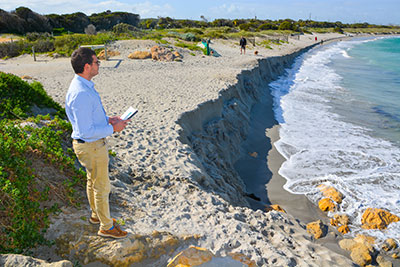Over forty mayors and councillors from across the country released a joint statement last month, committing to economic recovery solutions that both create jobs and tackle climate change.
In a mass commitment to a sustainable economic recovery the councils, all members of the Cities Power Partnership, Australia’s largest local government climate network, aim to support industries and sectors that invest in a zero carbon future, along with driving strong economic recovery for communities hit hard by a year of drought, bushfires and COVID-19 crises.
City of Ryde, New South Wales, Mayor, Jerome Laxale said all councils must play a role in sustainable economic recovery and climate change.
“Local governments across Australia can lead communities through a zero carbon recovery by prioritising local jobs, building sustainable infrastructure and investing in renewables.”
Blue Mountains City Council Mayor, Mark Greenhill, whose community continues to feel the impacts of the horrific Gosper’s mountain fire, said the community was crying out for solutions that would give a much-needed boost to the local economy and safeguard against future climate shocks.
“As mayor of a community hit by last season’s catastrophic bushfires, which were supercharged by climate change, it’s extremely disappointing to see that climate remains a glaringly missing piece on the Federal agenda.
“The Blue Mountains community, which is heavily dependent on tourism dollars, has largely been cut off since October 2019. Some people simply cannot afford to rebuild their homes, and many have lost their jobs. We can’t pay the price of
inaction much longer.
“That’s why I am standing alongside mayors from across the country to usher in job-creating, clean energy solutions that transition our economy away from the key drivers of the climate crisis, like coal and gas, and make communities like mine stronger and more resilient – it’s crucial.”
The mayors and councillors from New South Wales, Queensland, Victoria, South Australia and Western Australia signed the joint statement, outlining eight solutions from renewable energy through to sustainable transport that put local governments on a practical, jobs-rich path to future-proof cities, reduce energy costs and create more comfortable homes and workplaces.
Award winning aspirations
City of Melbourne’s Renewable Energy Project Two (MREP 2) claimed the Climate Council’s Cities Power Partnership Renewable Energy Achievement Award on 29 October.
Facilitated by the City, the power purchase agreement will provide 110 GWh of renewable electricity per year to the purchasing group of large energy users, over 10 years.
The purchased wind power, produced in rural Victoria, will be used to power 14 shopping centres, nine office buildings, seven educational campuses, and four manufacturing facilities across greater Melbourne.
Where MREP 1 established a new wind farm and saw many local councils and cultural institutions become powered by renewable energy, in facilitating MREP 2, the City of Melbourne is educating and empowering large energy users to understand the role they can play in achieving the ultimate goal: for all of Melbourne to be powered by 100 percent renewable energy.
Bold targets
Cockburn Council’s Climate Change Strategy 2020-2030 is leading the way in Western Australia, by adopting bold waste, emissions and renewable energy targets.
The council was awarded a Highly Commended for Renewable Energy Achievement.
Cockburn was the first council in Western Australia to set a zero waste target following the adoption of a Climate Change Strategy 2020-2030.
Its vision is for 100 percent of non-hazardous waste to be diverted from landfill by 2030, in line with the Western Australian Government-endorsed waste hierarchy where avoidance of waste generation is the most preferred option.
The inaugural strategy outlines a resilience roadmap with bold aspirational targets for 2030 including corporate targets of net zero emissions and a transition to 100 percent renewable electricity.
The City has the largest inventory of renewable energy systems of any local government in Western Australia including 5700+ solar panels (1.5 megawatts) across 21 community buildings, plus wind turbines, geothermal heating, methane gas capture and solar LED lighting.
In May the Cockburn community were asked to give their vision for a sustainable and climate resilient future with 300+ responders contributing their views.
The consultation attracted one of the City’s highest ever visitation rates on its Comment on Cockburn online project page, with more than 2000 visitors in addition to nine digital workshops.
City of Cockburn Mayor, Logan Howlett said the City had been taking decisive and responsible action on climate change since it joined the Cities for Climate Protection Program and undertook its first greenhouse gas inventory in 1999.
“Over the next 12 months, the City will undertake a green hydrogen feasibility study, an electric waste truck trial, and commence upgrades to smart, energy-efficient street lighting.
“The City will also continue to offset its fleet emissions, deliver sustainability and environmental education programs and maintain its status as a Gold Waterwise Council with the Water Corporation.”
The City was the first council in Western Australia to become a Cities Power Partnership Champion.
Sustainable future
Seven out of ten local governments in the Hunter Region, New South Wales’ largest coal producing area, have joined the Cities Power Partnership with Lake Macquarie City, Port Stephens and Cessnock City committing to tackle climate change and embrace clean energy to create jobs.
Cities Power Partnership acting director Dr Portia, said, “Right now, local governments have an opportunity to accelerate projects that will deliver local jobs quickly and tackle long term challenges like climate change. It’s brilliant to see more regional councils sign up to the program to help deliver a safer climate and stronger economy for their communities.”

















